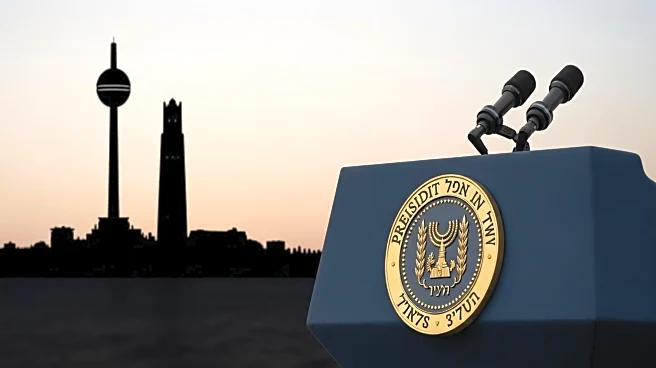What's Happening?
President Trump has arrived in Tel Aviv, where he was welcomed by Israeli President Isaac Herzog and Prime Minister Benjamin Netanyahu. The visit follows the successful negotiation of a deal that led to the release of hostages held by Hamas in Gaza for 738 days. President Trump is scheduled to meet with the families of the hostages and address the Israeli Parliament. This diplomatic engagement underscores the ongoing U.S. involvement in Middle Eastern affairs and highlights the importance of international cooperation in resolving complex geopolitical issues.
Why It's Important?
President Trump's visit to Israel is a significant diplomatic event, reflecting the U.S.'s role in facilitating peace and stability in the region. The release of hostages marks a critical humanitarian achievement and may improve relations between Israel and Palestine. This development could influence U.S. foreign policy and its approach to Middle Eastern conflicts, potentially leading to increased diplomatic efforts and collaboration with regional leaders. The visit also emphasizes the importance of addressing human rights issues and supporting affected families.
What's Next?
Following President Trump's visit, there may be further diplomatic discussions aimed at strengthening U.S.-Israel relations and addressing broader regional security concerns. The successful negotiation could pave the way for future peace talks and initiatives to resolve ongoing conflicts. Stakeholders, including political leaders and international organizations, may respond with increased support for diplomatic solutions and humanitarian efforts. The situation remains dynamic, with potential implications for U.S. foreign policy and international relations.
Beyond the Headlines
The hostage release and President Trump's visit highlight the complex interplay of diplomacy, security, and human rights in international relations. Ethical considerations regarding negotiation tactics and the treatment of hostages may arise, influencing future diplomatic strategies. The event also underscores the cultural and historical significance of U.S.-Israel relations, potentially affecting public perception and policy decisions. Long-term shifts in regional dynamics could emerge, impacting global geopolitical landscapes.









